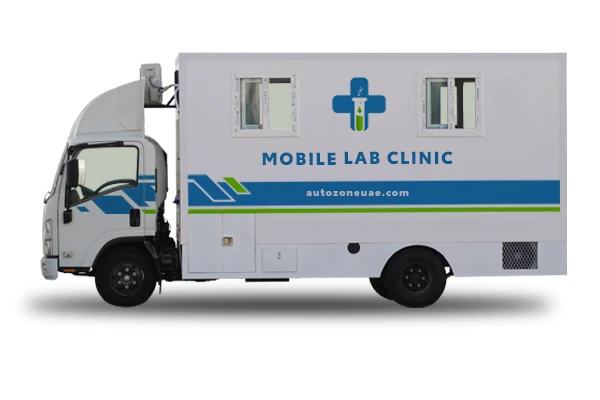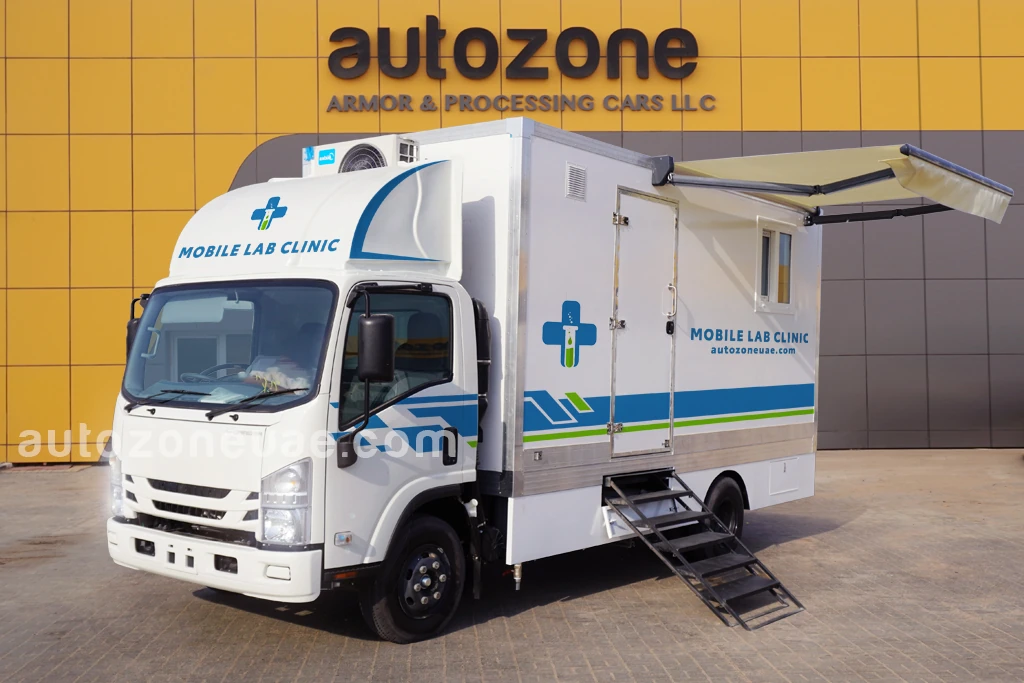In a world driven by scientific discovery and innovation, the accessibility of cutting-edge research tools has never been more critical. Imagine if the marvels of science and technology could be brought right to your doorstep, providing solutions to pressing questions and challenges. This is precisely where mobile laboratory truck come into play, revolutionizing the way we engage with science.
Mobile Laboratory Trucks: these unassuming yet remarkable vehicles are changing the face of scientific exploration, making it possible to conduct experiments, research, and testing virtually anywhere. In this blog post, let’s embark on an intriguing voyage as we delve into the realm of these mobile marvels, unveiling how they bring the wonders of science closer to you in ways you may never have envisioned. The versatility and capabilities of mobile laboratory trucks are expanding the horizons of scientific inquiry. They are transforming fields ranging from healthcare to environmental research, offering on-site testing, data collection, and analysis. With these mobile labs on wheels, science is no longer confined to sterile laboratories. It’s hitting the road, heading into communities, schools, and remote areas, and bringing the wonders of discovery closer to us all.
Join us as we delve into the inner workings, applications, and immense potential of mobile laboratory trucks. Discover how they are not just vehicles but catalysts for progress, innovation, and accessibility. Buckle up for a captivating journey that showcases how these mobile laboratories are shaping the future of science and leaving no corner of the world untouched by the spirit of inquiry.
Technology and Features
Mobile laboratory trucks serve as far more than just vehicles; they act as state-of-the-art scientific platforms, equipped with cutting-edge technology and specialized features that facilitate a wide range of scientific endeavors. Here’s a closer look at the technology and features that make them exceptional:
Advanced Instruments and Equipment:
Inside these rolling laboratories, you’ll find an impressive array of scientific instruments and equipment. From high-performance microscopes and spectrometers to sophisticated analytical tools, these trucks are equipped with the latest gear to ensure accurate and precise data collection.
Customized Workspaces:
The interiors of these trucks are meticulously organized to accommodate various research setups, including wet labs, cleanrooms, and equipment storage areas. This adaptability allows scientists to tailor the workspace to specific experiments.
Data Management Systems:
Recognizing data as a cornerstone of scientific research, mobile labs come equipped with advanced data management systems. These systems facilitate real-time data collection, storage, and analysis, thereby streamlining the research process and ensuring the preservation of valuable data.
Environmental Control:
Maintaining controlled conditions is crucial for many experiments. Mobile laboratory trucks are equipped with environmental control systems that can regulate temperature, humidity, and other variables, ensuring the integrity of experiments conducted on-site.
Mobility and Power Generation:
To function effectively in diverse locations, these trucks are engineered for mobility. They often feature robust power generation systems, allowing them to operate independently, even in remote areas without access to external power sources.
Safety Measures:
Safety is paramount in scientific research, and mobile laboratory trucks are no exception. They are equipped with safety measures such as fire suppression systems, emergency eyewash stations, and chemical spill containment equipment to ensure the well-being of researchers and the environment.
Communication and Connectivity:
Staying connected is vital for collaboration and data sharing. Communication systems, including satellite internet and high-speed networks, equip these labs, enabling researchers to collaborate with colleagues worldwide.
These technological marvels are a testament to human ingenuity and the relentless pursuit of knowledge. They provide scientists with the tools and resources they need to conduct groundbreaking research wherever it’s needed. In the next section, we’ll explore how these mobile laboratory trucks are enhancing accessibility and outreach, making science genuinely inclusive.

Benefits and Applications of Mobile Laboratory Truck
Mobile laboratory trucks are transforming the landscape of scientific research and practical applications in various fields. Their versatility and mobility are opening up new possibilities and addressing critical challenges. Here, we’ll explore the wide-ranging benefits and applications of these remarkable vehicles:
On-Site Testing and Research:
One of the primary advantages of mobile laboratory trucks is their ability to bring scientific research directly to the source. These labs deploy where they are needed most, actively conducting environmental assessments in remote locations, analyzing samples in disaster-stricken areas, and delivering healthcare services in underserved communities.
Rapid Response to Emergencies:
Mobile laboratory trucks play a vital role in disaster management and emergency response. They can quickly deploy to disaster-stricken areas to assess environmental and health risks, test for contaminants, and provide crucial data to guide relief efforts.
Healthcare Accessibility:
In the realm of healthcare, mobile laboratory trucks are enhancing accessibility to diagnostic services and medical care. They can serve as mobile clinics equipped with diagnostic equipment for medical tests, screening, and disease monitoring, making healthcare more accessible to rural and remote populations.
Environmental Monitoring:
Environmental scientists rely on mobile laboratories to monitor air and water quality, assess soil conditions, and study ecosystems in situ. This capability is essential for environmental conservation and pollution control efforts.
Research Expeditions:
Mobile labs are invaluable for researchers conducting field expeditions, whether in the wilderness, at sea, or in remote regions. They enable scientists to gather data and conduct experiments without the need for extensive transportation of samples back to a central lab.
Educational Outreach:
Mobile laboratory trucks also serve as educational tools. They can visit schools and communities, engaging students and the public in hands-on science experiments and demonstrations, inspiring the next generation of scientists.
Cost Efficiency:
Mobile laboratory trucks offer cost-effective solutions by eliminating the need for transporting samples or equipment to distant laboratories. This not only reduces transportation costs but also minimizes the risk of sample degradation during transit.
Research Mobility:
Researchers can follow the data and move their laboratories to locations of interest, allowing for dynamic and adaptable research strategies.
The applications of mobile laboratory trucks are as diverse as the fields they serve. Whether it’s advancing medical diagnostics, safeguarding the environment, responding to crises, or inspiring scientific curiosity, these mobile marvels are at the forefront of innovation and accessibility. In the next section, we’ll delve into the technology and features that empower these rolling laboratories to carry out their mission effectively.
Accessibility and Outreach
Mobile laboratory trucks are not only about conducting scientific research but also about making science accessible to a broader audience. Here, we’ll explore how these rolling laboratories are reaching out to communities, schools, and remote areas, promoting education and engagement:
Community Engagement:
Mobile laboratory trucks are bringing science directly to communities. They visit neighborhoods, festivals, and events, providing interactive science exhibits and engaging activities. This hands-on experience sparks curiosity and fosters an appreciation for science among people of all ages.
School Programs:
These trucks are a valuable resource for educators. They visit schools, offering students the opportunity to experience natural science in action. Students can participate in experiments and interact with scientists, inspiring them to pursue careers in STEM fields.
Remote Areas:
Mobile laboratory trucks bridge the gap in areas with limited access to scientific facilities. They can reach remote regions, enabling critical research and healthcare services where traditional infrastructure may be lacking.
Public Awareness:
Mobile labs serve as ambassadors for science, raising public awareness about important issues. They engage in public health campaigns, environmental initiatives, and awareness programs, helping communities understand and address pressing challenges.
STEM Advocacy:
By bringing science to life in a tangible way, these trucks contribute to STEM (Science, Technology, Engineering, and Mathematics) advocacy efforts. They help nurture a new generation of scientists, engineers, and innovators who are equipped to tackle global challenges.
In essence, mobile laboratory trucks are democratizing science, making it inclusive and accessible to all. Their outreach efforts not only empower individuals but also contribute to informed decision-making in various sectors.
Challenges and Future Trends
While mobile laboratory trucks offer immense potential, they also face certain challenges and hold promising prospects for the future:
Mobility and Infrastructure:
Operating in diverse environments can be challenging. Mobile laboratories must contend with road conditions, access limitations, and logistical complexities. Future developments may focus on improving mobility and adaptability.
Sustainability:
Sustainability is a growing concern. Efforts are underway to reduce the environmental footprint of mobile labs through innovations in power generation and waste management.
Technological Advancements:
As technology evolves, so do the capabilities of mobile laboratories. Researchers and developers are expected to advance miniaturized and portable scientific instruments, thereby enhancing the range of experiments that can be conducted on-site.
Data Integration:
Seamless integration of data collected in the field with larger scientific databases is essential. Future trends may involve the development of cloud-based systems for real-time data sharing and analysis.
Customization:
Mobile labs may become more customizable to meet specific research needs, allowing scientists to configure their rolling laboratories for unique experiments.
International Collaboration:
Collaborative efforts among countries and organizations may lead to the deployment of mobile laboratory trucks for global research initiatives and disaster response.
As these challenges are addressed, and new technologies emerge, the future of mobile laboratory trucks appears bright. They will continue to play a pivotal role in scientific research, outreach, and innovation, ensuring that science truly knows no bounds.
Conclusion
Culminating our exploration, mobile laboratory trucks shine as beacons of progress and accessibility in the dynamic realm of science. Beyond the confines of traditional research, these mobile marvels have left an indelible mark, reaching the farthest corners of our world.
From delivering crucial healthcare services in underserved areas to fostering STEM education and inspiring future scientists, engineers, and innovators, mobile laboratory trucks have demonstrated their incredible adaptability and versatility.
In the realm of environmental research, they’ve unlocked the door to untouched ecosystems, revealing the wonders of our planet and emphasizing the urgency of conservation. During the relentless COVID-19 pandemic, these rolling laboratories emerged as unsung heroes, conducting mass testing and contributing significantly to the battle against the virus.
Nevertheless, as with any pioneering endeavor, challenges persist. The call for enhanced mobility, sustainability, and seamless data integration beckons us to chart the next frontier of innovation. The relentless march of technology ensures that these rolling laboratories will continue to evolve, pushing the boundaries of what’s possible.
In conclusion, one thing is abundantly clear: the future of science is undoubtedly on the move. Mobile laboratory trucks have irrevocably changed the landscape of scientific engagement, making it more accessible, inclusive, and ever-expanding. They encapsulate the spirit of inquiry, the relentless pursuit of knowledge, and the unwavering commitment to making our world a better place.
So, the next time you spot one of these unassuming vehicles on the road, remember that they carry the promise of discovery, the power of innovation, and the hope for a brighter, more informed future. With mobile laboratory trucks leading the way, science knows no bounds, and the wonders of exploration are just a road trip away.

 AR
AR FR
FR






